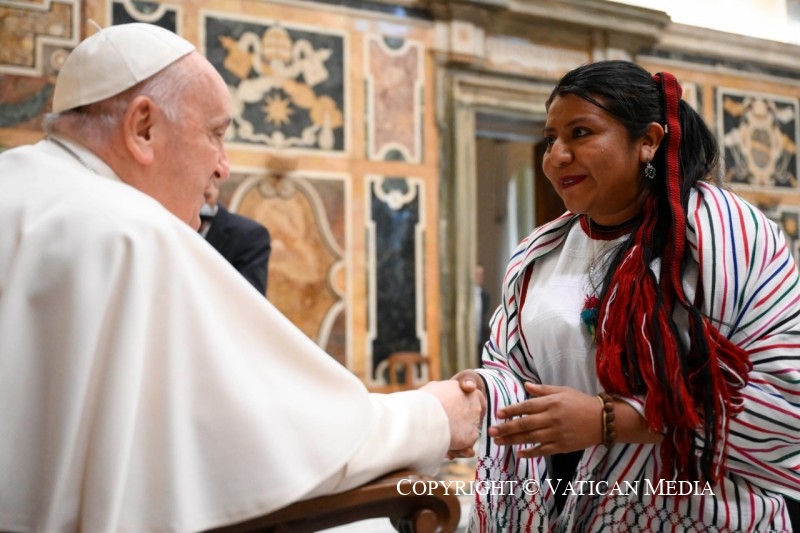Vatican promotes alliance between science and Indigenous peoples
The Pontifical Academies of Sciences and Social Sciences is holding a workshop to explore how the knowledge of aboriginal communities and the scientific world can, together, meet major global challenges. Pope Francis urges governments “to acknowledge and respect the rich diversity within the great human family.”
Vatican City (AsiaNews) – Science should engage in dialogue with Indigenous peoples “to confront in a new, more integral and more effective way such crucial issues as water, climate change, hunger and biodiversity,” said Pope Francis this morning when he met at the Vatican Apostolic Palace the participants at the Indigenous Peoples’ Knowledge and the Sciences workshop currently underway in Rome.
Organised by the Pontifical Academies of Sciences and Social Sciences, the meeting has drawn representatives from the world’s Indigenous communities and leading scientists with the expressed aim of building a bridge between their respective systems of knowledge and explore new opportunities to solve major global challenges.
Asia’s Indigenous peoples are also represented at the event. Among the speakers are Dr Viswajanani Sattigeri, head of the Traditional Knowledge Digital Library Unit in New Delhi (India); Dr Anamika Dey, whose talk will focus on Indigenous women-led community knowledge-based bio-enterprises in Gujarat; and Prof Lun Yin, from Southwest Forestry University in Kunming (China), who studies the contribution of Aboriginal communities to the preservation of biodiversity.
In his speech, delivered by to Fr Pierluigi Giroli, Pope Francis noted that the UN’s Food and Agriculture Organisation also promoted a platform of this kind to ensure the protection of the food systems of the first communities. But the dialogue needs to grow, by listening to one other and be extended to other areas as well.
“This study seminar also sends a message to government leaders and to international organizations, encouraging them to acknowledge and respect the rich diversity within the great human family.”
In fact, “The fabric of humanity is woven with a variety of cultures, traditions, spiritualities and languages that must be protected, since their loss would represent an impoverishment of knowledge, identity and memory for all of us.
Hence, “projects of scientific research, and accordingly investments, ought to be directed decisively to the promotion of human fraternity, justice and peace, so that resources can be coordinated and allocated to respond to the urgent challenges facing the earth, our common home, and the family of peoples.
This goal today requires conversion. “In the dialogue between indigenous knowledge and science, we need to keep clearly in mind that this entire patrimony of knowledge should be employed as a means of overcoming conflicts in a nonviolent manner and combating poverty and the new forms of slavery.”
It is important to keep in mind that we are all called “to an ecological conversion, a commitment to saving our common home and to fostering intergenerational solidarity in order to preserve the life of future generations, rather than wasting resources and aggravating inequality, exploitation and destruction.
Lastly, “I encourage you to draw from the patrimony of the wisdom of your forebears and from the fruits of your scientific research the vital energy needed to continue to cooperate in the service of truth, freedom, dialogue, justice and peace.”
To this end, “The Church is with you, an ally of the Indigenous peoples and their wisdom, and an ally of science in striving to make our world one of ever greater fraternity and social friendship.”







.png)










